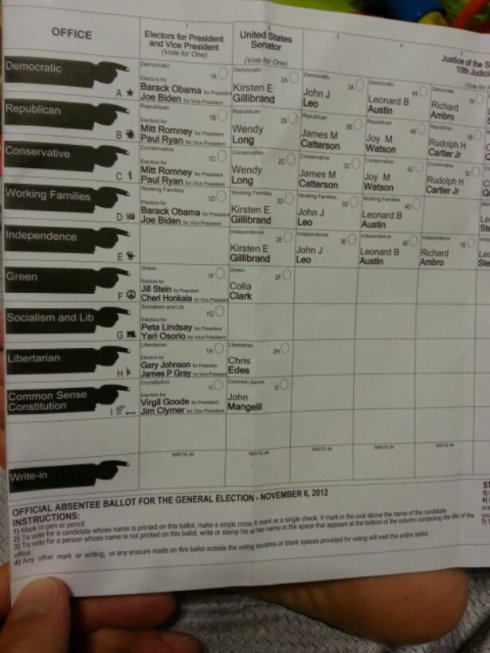Democracy doesn’t mean much if people have to confront concentrated systems of economic power as isolated individuals. Democracy means something if people can organize to gain information, to have thoughts for that matter, to make plans, to enter into the political system in some active way, to put forth programs and so on. If organizations of that kind exist, then democracy can exist too. Otherwise it’s a matter of pushing a lever every couple of years; it’s like having the choice between Coca-Cola and Pepsi-Cola. ~ Noam Chomsky
People who are new to voting in the United States may be surprised when they receive the presidential ballot: That there are more than two candidates on the ballot. For most states this year, for example, there is also the Libertarian Party, the Green Party, Americans Elect, and the Constitution Party…etc. A brief web search will give you the main platforms of these parties, and many Americans may discover that these alternative parties are proposing policies that are closer to their ideals of what role the government should or should not play in our lives, as opposed to the current two party polarization where issues that are vital to some people’s hearts (support for families, environmental sustainability, downsizing of big government, regulation of banks … to quote a few disparate examples) are not part of the agenda of either party this year.
The frequent argument against voting for these parties is that it is futile: because they never have and never will win the majority of the votes. And in fact if you vote for them, you may divide the votes for the preferred candidate among your two choices. The close win of George W. Bush over Al Gore was a disappointment to many people who would have preferred Gore as a second choice to their third party vote, for example.
However, there are two main reasons that third parties need votes. First, having a percentage of the votes can help these parties stay on the ballot for the next election. Second, and more importantly, even if they are never elected due to the constraints of the current system, seeing that the third parties are receiving most of the independent votes will force the current two major parties to reconsider their current platforms. This has happened in the past. During the Great Depression of the 1930’s, a previously unseen turnout for The Socialist Party scared the Democratic Party under Franklin Roosevelt into formulating The New Deal, with strong regulations for banks and large employment plans that bolstered the middle class, bringing on another golden age.
So how can you prevent a splitting of the vote while making your voice heard through a third party vote?
If you live in a state where, in the past and according to polls, a clear majority has consistently voted for one party or the other… Say New York has nearly always voted for a Democratic candidate. You could consider voting for a third party – as your one vote is unlikely to change the vote of your state. In this day and age where corporations contribute equally to both parties to ensure their future, here is your way of ensuring yours.


Excellent article, but I would like to comment on the claim that the turnout for the socialist party was what shocked people into action. While surely a contributing factor, that is merely one of many symptoms, some of which were much more noticeable than a third party election result. Like the proliferations of places like Hooverville, directly in the Backyard of many Americans. The political backlash of places like these and the misery of the general electorate forced everyone to Action – regardless of Election results.
So yes, third party votes remain an important tool for signalling politics about the Nations allegiances – but in close elections people in the swing states should still focus their electoral power. But non-swing states should still feel free to vote green. Next election season, anyway.
That is true. I’ve been reading about how the general atmosphere of dissatisfaction was what drove ‘progressive’ policies into place around the Great Depression. It is merely depressing to realize that, with the recent election, the two main parties of choice are both still supporting war measures, and have no intention of curtailing indiscriminate financing… plus the other measures that are actually vital to a healthy country. It seems that a minority/extremist viewpoint has taken hold of US politics. Perhaps my own morbid fascination with it is also giving it credence to what is assuredly minority (who have truly thought it out and whom we can understand to have a very interesting agenda indeed, and then there are the followers). A little information with catchy memes (Support our Troops!) is dangerous in the hands of the mass uninformed/unwilling to be informed. I believe your fascination with American politics would concern this pathology as well? Are there similar situations in Germany?
Anyway I’ve heard is that there has been a revolution in the past decade, and it has been welded by the richest of the population. And it has been won.
And Hi Nick! Long time no talk!